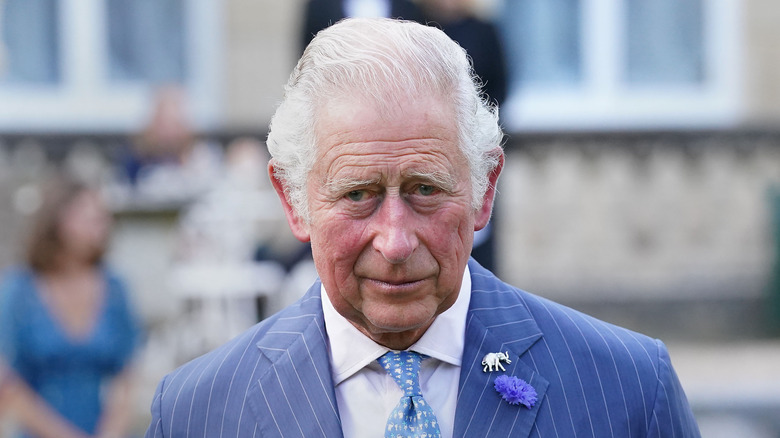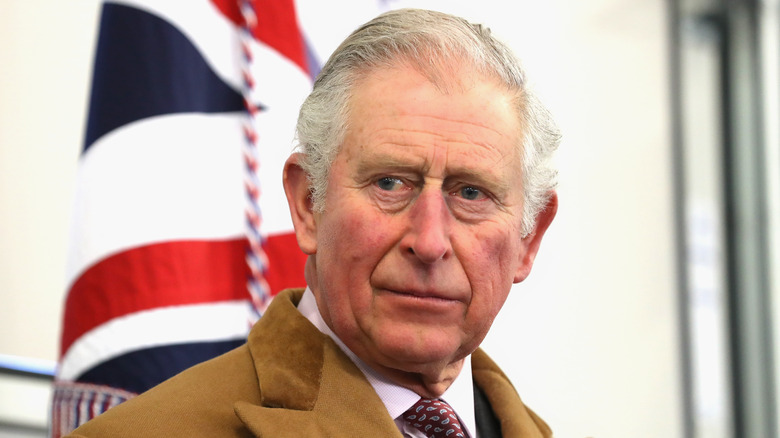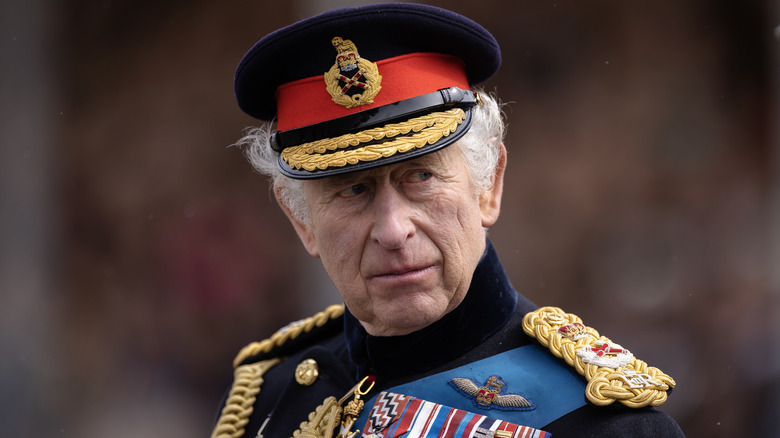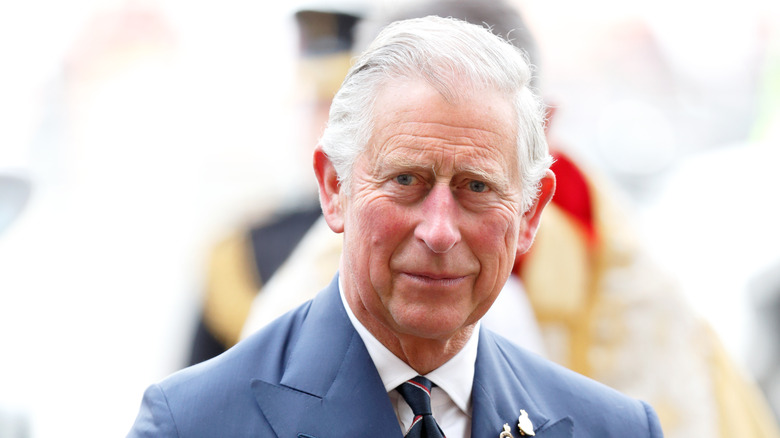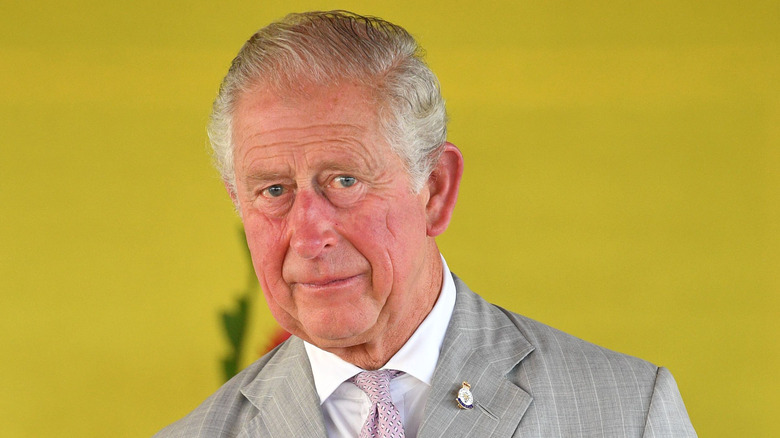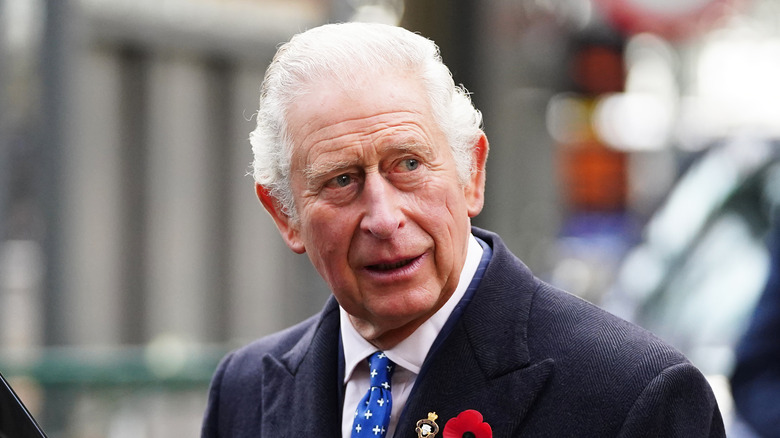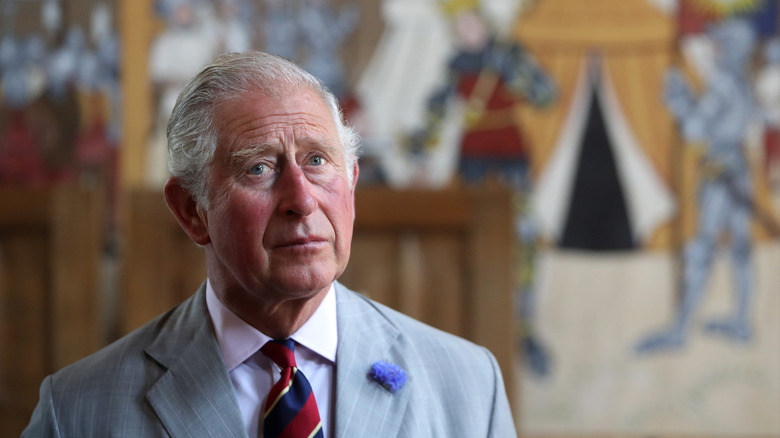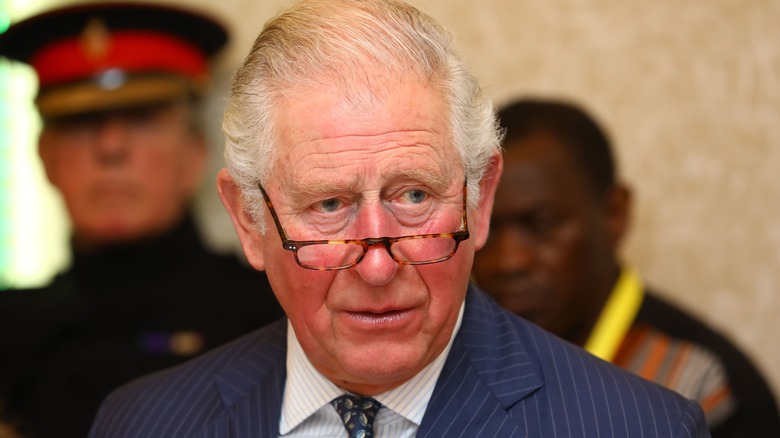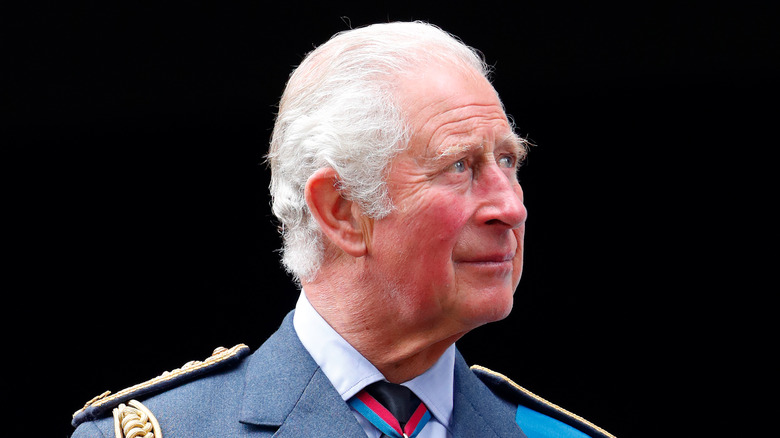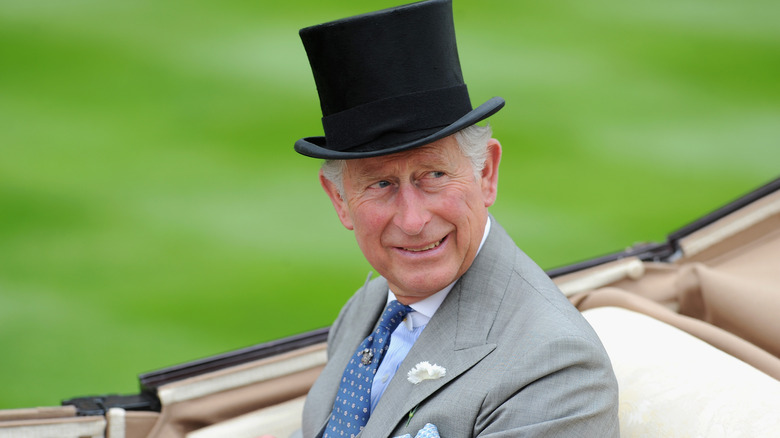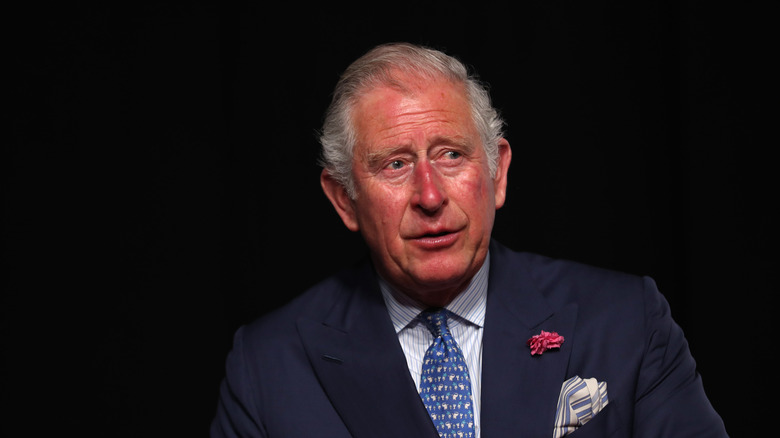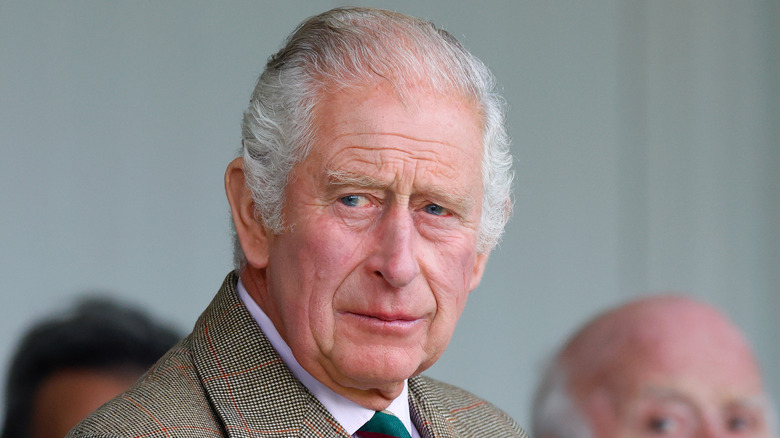The Prince's Trust: All About The Charity King Charles Founded And The Controversy It Is Facing
While the role of a senior member of the royal family is largely ceremonial, there are specific issues that are usually spearheaded — take children's issues, which is being led by Princess Catherine, or environmental science developments, which is Prince William's cause. Prince Harry started the Invictus Games and has focused largely on veterans' affairs, while Meghan Markle has focused on issues of gender and race equality. While these issues could certainly be seen as political, many members of the firm try to walk the line between advocacy and political neutrality — one royal who hasn't done that very well, however, has been King Charles III.
Before he became king, Charles made many of his more political thoughts clear, especially having to do with environmental issues. Perhaps one of the causes closest to his heart, however, manifested into the Prince's Trust. Dating all the way back to 1976, Charles spearheaded fundraising efforts that have since developed into a fruitful organization that supports youth across the Commonwealth. And while the trust has been responsible for a large body of support for young people in Britain and beyond, it certainly has not been immune to controversy. From racial discrimination suits to workplace harassment to extremely questionable donations, the Prince's Trust has been at the center of ongoing controversy since its very onset. Here, we're taking a closer look.
What is the Prince's Trust?
Before we get into the controversies surrounding it, let's get into what the Prince's Trust is all about. Established by King Charles III, then the Prince of Wales, in 1976, the Prince's Trust is one of the royal's many charity organizations. The trust is designed to help young people get access to resources they need in order to reach success, or to get their lives back on track. From young professionals who are struggling to find work, or students who are facing social difficulties or challenges within their schooling, the Prince's Trust puts money where its mouth is and focuses on getting them out of these situations. Such resources include providing mental health counseling, legal help if needed, and consistent housing if home insecurity is an issue.
Typically, the Prince's Trust aligns with roughly 60,000 people a year providing the aforementioned resources. There has been a tremendous amount of success as well — somewhere around 75% of those supported by the Prince's Trust have moved into vocational training, steady employment, or educational paths forward.
Additionally, the Prince's Trust is known for its massive fundraising events, namely the Prince's Trust Concert that first started in 1986. By 2015, the organization's efforts expanded to international countries — namely Commonwealth members — and is still in operation today. While it has done a tremendous amount of good, the Prince's Trust has been riddled with controversy in more recent years.
One of the first controversies to hit the Prince's Trust was in 2002
As the Prince's Trust grew in size and influence over time, it brought in employees to ensure its success. One was Dee Narga, who served as the West Midlands volunteer director starting in 1998. Her time with the trust, however, was cut short in 2002.
As the BBC News reported at the time, a trust executive named John Greenshaw allegedly slapped Narga on the behind in the workplace in July 2001. When she went to her higher ups with a report of the incident, Narga claimed that her bosses did not take her allegations to heart, subsequently ignoring the situation. "During the break I walked out of the room to get some fresh air and stretch my legs. I heard the voice of Mr. Greenshaw behind me," Narga — who sued the Prince's Trust for sexual discrimination – explained in court. "A brief conversation was had about the usefulness of the workshop and on a lighter note we shared some views about the lack of usefulness of some individuals. I went to walk away and felt my bottom being slapped sharply. I immediately looked at him in the eyes. I was so shocked and unable to reprimand him and walked down the corridor".
According to The Birmingham Post, the Prince's Trust's legal team worked out a settlement with Narga. A rep for the trust said, "This was a deeply unfortunate incident which contravened all the Prince's Trust's expectations on behaviour to colleagues.'
Racial discrimination within the trust was revealed the following year
A lawsuit regarding sexual harassment was not a good look for the Prince's Trust, and there was more legal controversy a year later when football star Darren Beckford sued the organization for racial discrimination. As the Daily Mail reported at the time, the Manchester City forward was hired by the Prince's Trust to work with young people of color and appeal to the specific difficulties they faced. When he was dismissed from his role, Darren took to the legal system and sued the Prince's Trust, claiming that he was let go from his position due to his race. The football star originally won his case for unfair dismissal, but the Prince's Trust didn't back down. They appealed the original ruling on the basis of racial motivation, and once again the Prince's Trust was back in court.
In the highly-watched case, the Prince's Trust lost their appeal, and Beckford walked away with a large settlement. However, Beckford's attorney, John Hewison, said that it was just a portion of the accountability needed.
"[Beckford] is not happy that he has had no proper apology for what happened," Hewison said of the legal battle with the Prince's Trust. "I just hope (the charity) holds its hands up and say it is sorry about it all." In response, the Prince's Trust announced that its commitment to diversity had been revisited.
A 2003 investigation put the trust in an uncomfortable situation
The Prince's Trust has faced a number of scandals over the years, despite a 2003 investigation that seemingly forced its hand. As reported by The Times, after a questionable donation was made to the Prince's Foundation — another one of King Charles III's organizations — by a Turkish billionaire who had faced accusations of fraud, Sir Michael Peat attested that all of the groups that fall under the Prince's Charities umbrella needed to face stricter scrutiny when it came to who could give money. As such, an internal investigation was conducted, concluding that money and its direction within the prince's various charities was being mishandled. Furthermore, the investigation found that the trust was going to great lengths to solidify said donations by wining and dining potential donors.
"The two things we need to do are to make sure, firstly, that they are not dodgy customers," Peat said in the aftermath of the investigation. "[And] secondly, that the entertaining must be proportionate."
As a result of the investigation, Charles' longtime aide, Michael Fawcett, was also asked to turn in his resignation. The digging had uncovered Fawcett's tendency to accept expensive gifts under the guide of the trust, to which the royal was said to be besotted by.
A political donation resulted in some serious controversy for the trust
It's largely known that members of the royal family aren't exactly encouraged to have any political affiliation. The royal family has maintained neutrality for decades, but King Charles III hasn't always been as successful in keeping his positions to himself. Such was evident in 2007 when the Prince's Trust was caught up in an intense scandal relating to a political party donation. Per The Telegraph, eyebrows began to raise when the organization partnered with Women2Win, a lobbying group dedicated to the conservative party and female politicians. The fundraiser brought in about $25,000, with half of it going to Women2Win specifically.
By 2011, a commission had been put in place to investigate the trust and its partnership with the political action group, namely focusing on the roughly $12,700 that went to Women2Win. Accused of violating charity law given the political affiliation of the lobbying group, the Prince's Trust and its actions back in 2007 were put under the microscope, but remained steadfast in its decision making. A representative of the trust at the time said that the transfer of money was the result of an agreement made with Margaret Thatcher, the former prime minister, and that it was all above board.
"It was all done in good faith, but the Charity Commission is looking into it and we will go from there," the representative said, per Third Sector. "It was one naive mistake by an overenthusiastic member of our fundraising team."
The Prince's Trust got into hot water with a wealthy donor in 2008
Much of the controversy surrounding the Prince's Trust has to do with donations, and a 2008 story pushed the organization into the spotlight. The Kanabus family, who is behind British grocery company Sainsbury's, alleged that the Prince's Trust misused funds donated — the fallout was incredibly messy.
Jason Kanabus, the son of Annabel Kanabus, was an admirer of King Charles III and believed in his initiative. As reported by the Daily Mail, Jason inherited the family's wealth and wanted to put his money to good use, investing in farming and young workers specifically. Tragically, he died just weeks before he reached age 30, and his family set out to move the money towards the Prince's Trust in his honor. The family ultimately donated about $3.1 million to the trust, but after a year of inheriting the first portion of money, the organization had not made any moves to invest it in farming, young agricultural professionals, and the causes that Jason believed in. Angered by the stall, the Kanabus family — through the estate's executors — demanded the remaining balance be paid back, which was about $1.9 million.
Per The Guardian, Jason's mother revealed she was heartbroken that the money had not been put to good use. "We asked them how many people have gone on to jobs in farming as a result of the £50,000 spent and they said none. We have asked for our money back."
Survivors of a child migrant scheme were not compensated as promised by the trust
The involuntary movement of peoples throughout the world has been a devastating reality for decades. Throughout the 20th century, a UK-based program called Fairbridge relocated children from low socioeconomic backgrounds to Canada, Australia, Zimbabwe, and New Zealand. Per the Independent, in 2018, the Prince's Trust promised to pay those impacted, many of whom had suffered sexual and physical abuse. However, such promises were not delivered.
As detailed by former prime minister Gordon Brown — a vocal critic of the scheme — the migration moved about 130,000 young people in total. As Brown put it, the scheme was "government-induced [human] trafficking." When it came time to pay, the Prince's Trust missed a crucial deadline and later revealed that the monetary compensation timeline would be extended by an additional two years.
The Prince's Trust acquired Fairbridge in 2012 with the intent to help those impacted by the scheme. Under the new name Fairbridge Restored, the organization pledged to compensate survivors who'd been moved to Australia. However, as the Independent reported in 2023, Fairbridge Restored apparently can only cover 1% of the claim value.
A star of The Crown didn't want any drama with the Prince's Trust
Any fan of Netflix's "The Crown" knows that the streaming service's hit drama about the royals doesn't always paint the members of the firm in the most positive light. From their personal plights and charged relationships to diplomatic issues and the reception of the monarchy, "The Crown" does take liberties, but even Prince Harry has admitted that it roughly captures the reality that member royal family members face. The Prince's Trust, oddly enough, was connected to Season 5 of "The Crown," but not in the way you might think. As it turns out, actor Dominic West — who brought a fictionalized King Charles III to life — is an ambassador of the Prince's Trust, and he even handed in his resignation amid filming.
West was concerned about whether or not being involved with both the trust and the show — the latter of which is not exactly a hit with the real-life members of the royal family — would be a problem. Commenting on the matter in an interview with Radio Times, he revealed that his offer to step down from his ambassadorship was not accepted by the Prince's Trust, and he received a letter stating just that.
"I think that's probably how [Charles] regards it," the actor explained of the royal's response. "I've been in a line to shake his hand a few times and it's fascinating. It's very useful to meet the character you're playing, obviously."
Unsecured loan donation in 2022 brought a new level of scrutiny to the trust
When you go to a museum or organization headquarters, it's likely that you see a wall full of the names of donors, each having a designation based on how much money they've handed over throughout the years. As related to the Prince's Trust, one such platinum donor that gave thousands to the organization was the Barrowman Foundation, founded by businessman Doug Barrowman. As noted by The Guardian, the foundation became one of the Prince's Trust's most reliable donors over the years, and the trust even named one of its central buildings after Barrowman, but things got tricky in 2022.
Barrowman himself faltered when he became the central figure of a tax avoidance scheme. Investigated by HM Revenue and Customs, Barrowman's efforts tried to push firms into hiring employees off the payroll in order to avoid paying taxes. As related to the Prince's Trust, the loans taken out in order to fulfill donations — as it turned out — were unsecured, and such money schemes were seen as problematic by the Charity Commission, prompting an investigation.
Speaking about the questionable tactics Barrowman used to donate to the Prince's Trust, while also taking part in a tax scheme himself, the Charity Commission representative said of the matter, "We have now opened a regulatory compliance case into the Barrowman Foundation and will engage with trustees to assess concerns."
A questionable donation was literally given to the prince via a suitcase in 2022
Yet another questionable donation left the Prince's Trust in bad light in 2022. According to The Guardian, the organization accepted payments from former Qatari prime minister Sheikh Hamad bin Jassim bin Jaber al-Thani, a controversial billionaire who handed over the money in a so-called "cash-for-honours" scheme. While the donation was viewed as legitimate, the nature of the cash movement and Qatar's history of human rights abuses forced King Charles III into very uncomfortable territory — unsurprisingly, the Charity Commission launched an investigation.
Taking a closer look at the scheme allowed the commission to discover that Charles received about $3.2 million from Sheikh Hamad over the years. While the organization maintained that the donations were above board, one of the payments took the form of cash packed into a suitcase — a very FBI-thriller film scenario. Another donation from Sheikh Hamad was literally cash put in a large bag, handed over to the trust.
Vocal critics of the donations were horrified that so much money transferred hands in such a casual capacity. Per iNews, PR professional Mark Borkowski was one such commentator, bringing Charles' then-future as king and the royal family's ability to relate to the everyday person into question.
A trust ambassador's personal scandal created significant blowback
While the Prince's Trust has been involved in a number of scandals related to the movement of money and donations from controversial figures, personal rumors have also done damage to its reputation. As the Mirror reported at the time, trust ambassador Phillip Schofield left the organization reeling in May 2023, after the famed "This Morning" host admitted to conducting a romantic affair with a young male staffer who worked on the show. The nature of the relationship was not the central issue, but rather Schofield's attempt to cover it up. As co-presenter Holly Willoughby said of the ultimate confession, "I asked Phil directly if this was true and was told it was not. It's been very hurtful to now find out that this was a lie."
The Prince's Trust quickly cut ties. Per BBC News, a trust rep said, "In light of Phillip's recent admissions, we have agreed with him that it is no longer appropriate to work together." Schofield was taken off of the Prince's Trust website which listed him as an ambassador, and all previous mentions of him and his work as part of the trust's efforts were removed. The "About" section on his own website reflected his dismissal from his ambassadorship post.
Amid the news, Schofield also skipped the Prince's Trust Awards and ultimately resigned his position on "This Morning."

